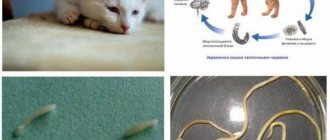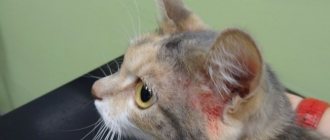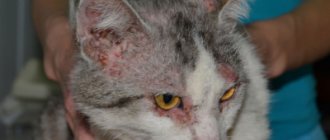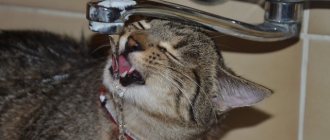Let's try to analyze the main reasons why a cat can constantly itch and lick itself, but it does not have fleas and, perhaps, never had any. What, then, is extremely troubling to your pet?
Cats are recognized as naturally clean people; they regularly take care of their fur, diligently brushing it and licking it thoroughly. This is the instinct of a predator, inherited by our pets from predatory ancestors. Therefore, catching a cat washing itself is a common occurrence.
But if a cat often licks and scratches beyond measure, this always causes justified fears among loving, attentive owners - it means that something wrong has happened to their pet. This restless behavior is a consequence of your pet being constantly itchy, but not necessarily due to fleas.
Various factors can contribute to the occurrence of severe itching. Therefore, a symptom such as scratching and licking should be a good reason to search for the cause and eliminate it as quickly as possible. Most likely, you will need a visit to the veterinarian, where it will be found out exactly why the cat is itching, and your beauty will receive adequate treatment.
With prolonged intense scratching, wounds, bald spots, irritation and damage to the skin occur, turning into an open gate for new infections, and your cat is at risk of secondary infection, which is even more difficult to fight. This is why it is so important to address the cause of the itching early so that your cat can recover faster.
Causes of itching in cats
Fleas on an animal
The most common probable cause of your cat itching all the time is a flea attack. But if you are sure that there are no fleas at the moment, then know that an allergy to a flea bite in some four-legged animals can last up to 6 weeks. Therefore, it is not surprising that the cat continues to worry all this time, although the fleas have been gone for a long time.
But when the cat is domestic, does not leave the apartment and it really does not have fleas, then the most likely reasons for constantly scratching and licking its fur may be the following problems:
- helminth infection;
- skin and other bacterial inflammations;
- ringworm and other fungal infections;
- lice, lice, mites and other external parasites;
- allergic manifestations of various origins;
- psychogenic factors;
- hormonal disorders.
Below we will take a closer look at each of the most common reasons why, in the absence of fleas, a cat is worried about severe itching, but in reality there are many more of them.
Wise Pippa knows why cats first lick a person and then bite them
Studies have shown that cats are happy to meet their owner after a long separation, so they express their joy in different ways. One of them is licking.
There are several reasons why cats do this:
- show attention. In this way they try to express their love and make it clear that the owner is important to them;
- marking territory. Most often, cats lick each other when they themselves cannot reach some area. This is first and foremost a sign of friendship. When a pet begins to lick its owner, this is a kind of territory marking. By licking a person, cats leave their scent, showing their belonging;
- play. Sometimes, during the game, a cat begins to first lick a person and then bite. You shouldn’t worry or scold the animal, because it shows that it’s having fun and that the pet wants to continue playing;
- relieves stress. If a cat licks itself all the time, then most likely it has suffered stress. In this case, the pet needs to be given attention, hugged and stroked.
Those who are not spoiled by their pet's licking and biting should not despair and think that the animal does not love them. There are many different ways your pet can show affection, so pay attention to his other actions.
Why do cats start biting their owner? If a cat first licked its owner and then started biting, there are several reasons for this. It turns out that cats can bite people in different ways. Moreover, what information she wants to convey to her owner depends on this. The most common cases when a cat licks first and then bites are:
- if the pet first licked the hand and then squeezed it with its teeth, this is a way of showing cat love. Cats bite each other in the same way. If a cat is hurt in this way, then there is no need to chase it away, it is better to stroke it or switch its attention to something else;
- If the cat bit into your hand and even let out its claws, then it really didn’t like something. It is possible that you somehow stroked her incorrectly. In this case, the cat must be left alone.
Often a bite is assessed as a declaration of love. It also happens that cats bite their owners so badly that they even have to seek medical help.
What does it mean if a cat first bites and then starts licking?
Experts give an unexpected answer to this question. It is believed that if an animal first bites and then licks a person, then it sees in him an equal to itself, and therefore treats it as it treats another cat. This is how cats show their behavior patterns.
There are cases when cats try to prove to their owner with their bite that they are sick or feel some kind of discomfort. Pets often lick damaged or diseased areas of their body. If a person touches this area, the animal may bite him.
Some cats, when licking their loved ones, themselves get great pleasure from this process. When an animal feels pain, it tries to hide it from strangers. Only an attentive owner will be able to notice that something wrong is happening to his pet. In case of the slightest suspicion, the animal must be shown to a veterinarian.
With
Infection with helminths as a cause of itching
Helminth
Helminths, if not regularly combated, can significantly annoy your pet, undermining its health from the inside.
The consequences of the vital activity and reproduction of worms in a cat’s body can be many troubles that bring suffering to your pet no less than fleas:
- The cat feels discomfort in the anus, itches and licks it;
- her stool and digestion are disrupted, her appetite is distorted;
- the coat becomes dull and the skin becomes dry and flaky;
- eyes turn sour;
- behavior becomes abnormal: apathetic or, on the contrary, excited.
Even the smallest kitten can suffer from worms if it is infected from its mother.
To prevent infection with worms, regularly clean with anti-helminth medications.
What to do if your cat constantly licks under its tail?
If a cat licks under its tail no more than once a day, then this can be considered normal. Some pets pay increased attention to hygiene. But when this process becomes obsessive, licking may leave bald patches or even small wounds. In such cases, the possibility of worms should be excluded first. Then they consider the option with fleas. Only after antiparasitic treatments can other causes be considered if symptoms persist.
Skin and other inflammations in cats caused by bacteria
Here we will touch only on those processes that provoke itching in different parts of the body and force the animal to scratch itself regularly.
Pyoderma
This is a severe bacterial infection of the superficial, or less often deeper, layer of the skin. The consequences of pyoderma are:
- the cat may go bald;
- become covered with pustules and crusts;
- the animal finds no peace, constantly itches furiously and meows.
Cats of all breeds are equally susceptible to infection, but the risk of complications is more often observed in animals with folds on the body, so the owners of such beauties have to be especially careful.
If the lesion has not affected the deeper layers and there are no complications, then recovery occurs quickly at home, but under veterinary supervision.
Ear infection
Symptoms of otitis media in a cat
Otitis in cats can provoke, in addition to severe pain and depression, a desire to scratch the sore ear with a paw.
The need to eliminate itching by frequent scratching results in the appearance of wounds and cuts, because the cat’s claws are sharp! Complete or partial baldness around the affected ear is also possible.
Treatment depends on whether the otitis media is caused by ear mites or bacteria. Therefore, it is better to visit a veterinarian, he will do a scraping for analysis and prescribe the necessary type of treatment.
Treatment
Treatment for itching in cats depends on what is causing it. That is, all the efforts of the veterinarian and the owner of the furry friend should be aimed precisely at eliminating the underlying disease, which is the root cause of the itching. Naturally, for different diseases and different sources of itching, the treatment will be different. Only a doctor can prescribe an effective treatment regimen for a purring disease that causes itching. If there are parasites, this will naturally be treated with special preparations. At the same time, not only the pet is treated, but also the places where it spends a lot of time (rug, house, pillow), its feeding place, all sorts of cracks and secluded places in the apartment are also treated to eliminate the possibility of re-infection.
If a cat has allergies, avoid contact with the allergen, prescribe a hypoallergenic diet, and change cat cosmetics and hygiene products.
In parallel with the treatment of the underlying disease, which is the root cause of the cat's itching, treatment is prescribed to alleviate the pet's condition: antiallergic medications that help relieve itching and other allergy symptoms, healing ointments and gels, vitamins are prescribed to support the animal's body. At the same time, the claws of the pussy are trimmed to minimize scratching, and a collar is put on to prevent the wounds from licking.
Ringworm and other fungal skin infections in cats
Trichophytosis (ringworm)
Take a close look at the areas where your cat scratches most frequently. If there is no hair there, and the bald patch resembles a circle, then it is ringworm.
Important! The disease is caused by a fungal infection. Is contagious to people! Be sure to start treatment as soon as possible!
At home, lichen can be easily and quickly treated in cats, but in people infected from a sick cat, treatment is more difficult.
Dermatomycoses
Fungal and yeast infections of the skin and fur of cats lead to similar symptoms that greatly annoy your pet.
Not dangerous for people. They are treated with specific therapy, which is prescribed by a veterinarian after examination.
Lice, lice, mites and other external parasites that cause itching
These unpleasant “guests,” including fleas, are called ectoparasites. All of them provoke severe itching, flaking of the skin, and hair loss.
The cat is forced to literally scratch its skin, injuring local and large areas.
If treatment is not started in time, secondary inflammation, suppuration, sepsis and baldness may occur.
The most dangerous and difficult for cats are:
- ear scabies - a mite that settles in the external auditory canal;
- sarcoptic mange, which affects various parts of the cat's body;
- notoedrosis, localized mainly on the face.
The animal is experiencing serious suffering, so it is better to begin treatment as soon as possible.
Allergic manifestations that cause itching
The cause of an immune attack in the form of dermatitis can be many factors, so identifying the allergen is easier to do by exclusion.
Nutritional factor
The most common complaint is itching. Here the easiest way is to identify the “culprit” by eliminating one of the components from the diet one by one. It’s better to remember and analyze when the problem arose and what it might be related to. Perhaps it was a transition to a new food.
Contact factor
When the influence of food and all of the above reasons is excluded, and the cat continues to itch intensely, he may be allergic to pollen from indoor plants, dust, air freshener, washing powder or soap, or shampoo.
Drug factor
If your pet is currently or recently on medication or has had a vaccination, stop treatment and wait. Drug dermatitis will go away on its own.
The cat constantly licks its tail - reasons and whether to worry
Absolutely every cat, regardless of its age, breed and living conditions, tries, as far as possible, to keep itself in ideal (by their standards) cleanliness. It is for this reason that the mustachioed pet carefully licks its fur, body, each paw, tail several times a day with great diligence and, of course, does not ignore its own genitals.
However, excessive zeal in the form of constant licking of the genital area can often alert vigilant owners and make them think about going to a specialist at the nearest veterinary clinic.
Hormonal imbalances that cause scratching
In fact, there are few of them, but some are not so rare. Therefore, it is better to have an idea about them when analyzing the causes of excessive itching.
Thyroid dysfunction
Both hypothyroidism and hyperthyroidism cause baldness, dandruff, itching, and tangled fur in cats.
Cushing's syndrome
Disruption of the adrenal cortex in the direction of intensification. Provokes alopecia on the sides and back. The skin becomes thinner, loses elasticity and strength. Visible comedones appear.











